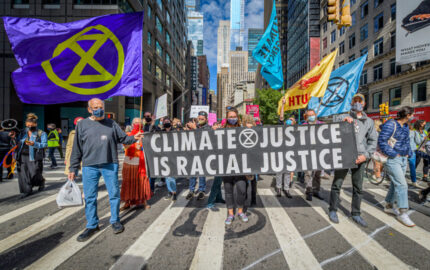
Photo by Arthur Rothstein. Courtesy of the Library of Congress.
To the extent that there has been any attention paid to public policy issues amid all the mud-slinging in the 2012 presidential campaign, the most frequent subject has been jobs—and which candidate can create more of them over the next four years.
So far, that debate mostly involves attacking the other guy, rather than advancing any real solution. The Obama campaign has been trying to define Mitt Romney as an effete champion of outsourcing (with some justification) while the Romney camp has dwelled on Barack Obama’s failure to reignite the job market (also with some justification, though in some significant part the failure is because of GOP obstruction).
Their descriptions of their own plans are no more edifying. As the incumbent, Obama has to run on his record—and despite his talk of bold solutions, that means either exaggerating his successes or making a lot of excuses.
Romney, meanwhile, offers little more than a collection of vague allusions to the wholly disproven theory that tax cuts lead to hiring.
The fact is that there is no Democratic jobs plan, if Republicans are able to keep either their control of the House or their ability to paralyze the Senate, or both. And there is no Republican jobs plan at all.
So what’s the press to do? There’s some value in differentiating between the two positions, which in this case has the added advantage of exemplifying each party’s central weakness (in one case a failure of will, in the other a departure from reality).
But read some recent scholarship on the subject, and it turns out there is much more to talk about than that.
Jeff Faux, a progressive economist who founded the Economic Policy Institute in 1986, is the author of the new book, “The Servant Economy: Where America’s Elite Is Sending the Middle Class.” “The mantra, as you know, in today’s political debate is jobs, jobs, jobs,” he told an audience at EPI recently. “Listen carefully because the subtext is low wages, low wages, low wages.”
Faux argues that by the mid-2020s, even with the most optimistic assumptions about economic growth, current trends indicate that the average American’s wages will drop about 20 percent. One big factor is that more and more good jobs will go overseas, leaving even America’s best and brightest no alternative but to enter the service industry.
“You go into an Apple store and you see the future,” Faux said. “The future’s not in the technology—the future of the labor force is all in those smart college-educated people with the T-shirts whose job is to be a retail clerk for Chinese goods.”
One impetus for job growth, Faux writes in his book, is that as the super-rich get even richer, they’ll need more and more servants:
They will hire people to take care of their large homes and to tutor their children in Chinese, tennis, and sophisticated strategies for getting into the best private schools and universities. They will hire personal assistants to shop, pay their bills, and run their errands. Coaches will come to their homes to instruct them in physical fitness, mental relaxation, and spiritual transcendence. They will need maids, cooks, and gardeners.
Neither party, Faux argues, is addressing the economic realities that make this the most likely future for our country—because changing course would require massive government intervention. There’s a pretty strong consensus among all but the most ideologically conservative economists that the solution would involve considerable public investment in education, infrastructure, and green energy, new policies to promote domestic manufacturing, more activist regulation of the financial industry in particular, and a more progressive tax structure.
But no matter who wins the election, Faux said, the governing elite has pretty much already ruled out that agenda, in favor of light regulation and governmental austerity.
“I think Romney and Ryan are reactionary disasters. But the last four years should have told us something, and that is the power of big money to intimidate the Democrats,” he said. “The deal has already been made … Government over the next 10 to 15 years will be starved for revenue.”
Still, Faux argues, someone should be making the argument to the public that “Hey, this is a big country. It needs a big government to solve its big problems.”
Peter Edelman, a law professor at Georgetown University, writes in his recent book “So Rich, So Poor: Why It’s So Hard to End Poverty in America” that the proliferation of low-wage jobs—not the lack of jobs—is the single biggest cause of persistent poverty.
“The first thing needed if we’re to get people out of poverty is more jobs that pay decent wages,” he argued in a July New York Times op-ed. “We’ve been drowning in a flood of low-wage jobs for the last 40 years… Half the jobs in the nation pay less than $34,000 a year, according to the Economic Policy Institute. A quarter pay below the poverty line for a family of four, less than $23,000 annually.”
And wages in the bottom half “have been stuck since 1973, increasing just 7 percent,” he noted.
Robert Pollin, co-director of the Political Economy Research Institute at the University of Massachusetts-Amherst, despairs that the goal of full employment—with a decent job for everyone who wants one—doesn’t even come up in the political debate these days.
In his new book, “Back to Full Employment,” Pollin writes that such a goal would be good for the economy, for fighting poverty, fostering social and economic equality—and is a matter of “basic ethics.”
Getting there, however, would require significant investments in clean energy and education, and “substantial levels of government intervention,” he writes.
With so much at stake, journalists have good reason to go beyond the empty sound bites and, at the very least, ask people who talk about creating jobs: What sorts of jobs?
But beyond that, it’s worth exploring the question of why a much bigger government response to the jobs crisis is so far off the political agenda of the governing class? How did that happen? Who benefits? And who loses? Those are certainly more intriguing things to ponder than whose zinger zinged the most.
Dan Froomkin, formerly deputy editor of the Nieman Watchdog website, is a new contributing editor to Nieman Reports. A senior Washington correspondent for The Huffington Post, he previously wrote a White House politics column for The Washington Post’s website.


